Young tourism entrepreneurs revitalize villages through creativity in Pingtan
en.ptnet.cn | Updated:2025-11-03 | Lin Kongbo, StephanieBeyond the postcard-perfect images of turquoise waters and silver sands, a quieter, deeper story is unfolding in the villages of Pingtan, China's second international tourism island in Fujian Province. Here, a new generation of storytellers, brewers, and innkeepers has put down roots. They are listening to the island's heartbeat, and their creative answer is not just building businesses, but weaving a stronger, more connected community.
Breathing Life into Local Culture
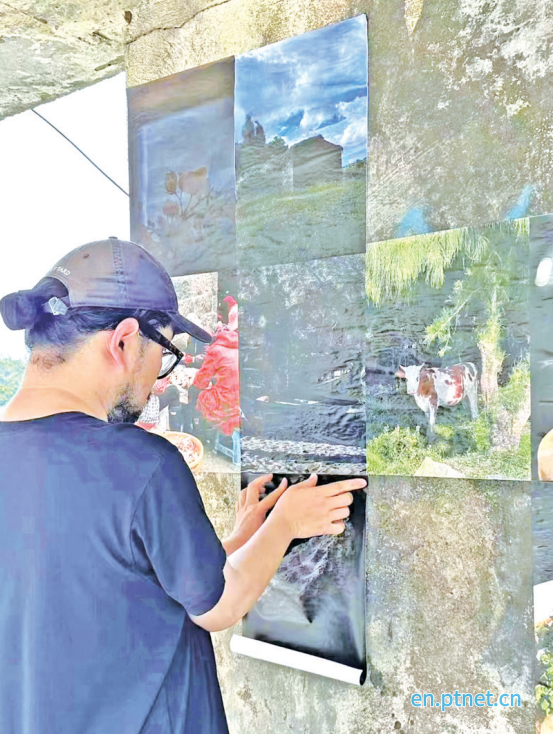
Kim, owner of Seal Brews café, decks Tanshui Village's old bus stop with intimate portraits of the local community—celebrating local fishermen and elders, and turning a mundane wait into a window of the island's soul. (File Photo)
For many tourists, travelling often stays on the surface—until entrepreneurs like Kim stepped in. Kim, a former footwear designer from Shanghai, runs Seal Brews café in Tanshui Village. To help visitors connect with the real Pingtan, she partnered with photographer Xiao Ye to weave a visual tapestry of the village's quiet rhythm: fishermen sorting seafood, women gathering shellfish by the shore, elderly residents in quiet repose, even stray dogs wandering the lanes. These photos were turned into "humanistic posters" at the village's bus stop—transforming a dull waiting area into a window into local life.
"The photos made me see myself in a new light," said 68-year-old villager Lin Dabo, a fisherman featured in one image. "I never thought my daily work could be something to be proud of." For visitors like Wu Yazi from Guangzhou, the posters were a revelation. "They didn't just show pretty views—they showed real people," she said. "It made me feel like I wasn't just passing through, but part of the village for a while."
Moqiao Homestay, another local spot, also focuses on cultural connection. During the Mid-Autumn Festival, its iconic blue door was dressed in wild flowers picked from village roads. On the back of each petal, staff attached small cards with Pingtan dialect phrases: "ka liu mo" (meaning "Want to go out and play?"), "hai ya lan" ("The sea is blue"), and "ya huan li" ("So happy"). In the evenings, the homestay hosted casual "dialect classes," where housekeeper Chen Liyun taught visitors these phrases and shared the stories behind them. "I still remember 'hai ya lan'," said a tourist who stayed there. "Now when I greet the villagers, I use it—and they always smile."
Warming Up Village Life
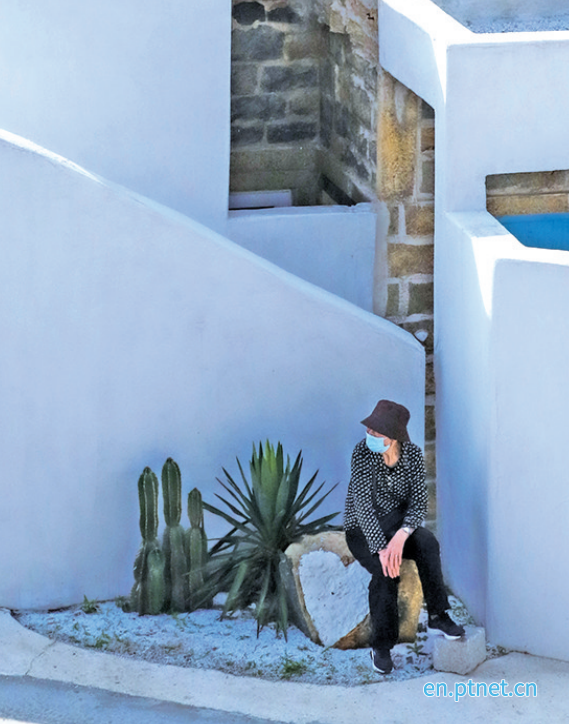
A local villager rests on a "love seat" – a stone chair painted with a white heart – outside Moqiao Homestay. The homestay added these seats to make waiting for buses more comfortable for the community. (File Photo)
These entrepreneurs aren't just serving tourists—they're becoming part of the community. Moqiao Homestay, for example, noticed that the village bus stop had no seats, even though buses came infrequently. So staff took local stones, painted large white hearts on them, and placed them as "love seats" by the stop. "It's a small thing, but it means a lot," said a villager who often waits there. The homestay also checks in on elderly residents living alone during festivals, bringing them rice and cooking oil. In return, the seniors send over homemade dried sweet potatoes or fresh vegetables—turning a business into a neighborly bond.
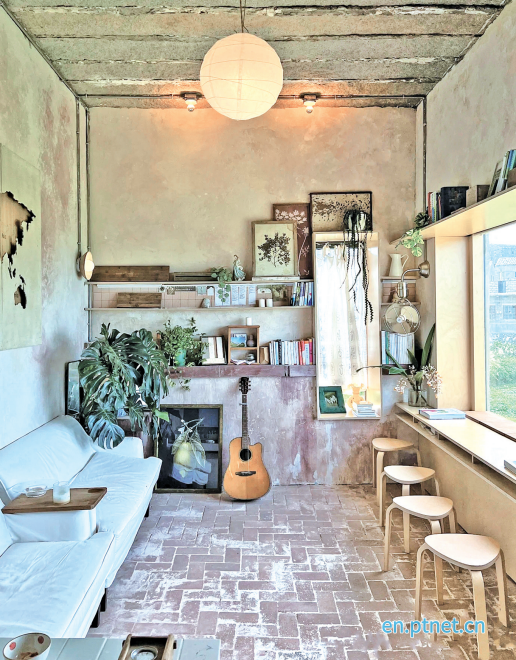
Inside Sad Puppy Club – a Pingtan drink shop that doubles as a "safe space for vulnerability" – warm lighting and cozy decor fill the air with an artistic, welcoming vibe.
This role of a community living room is also embraced by the Sad Puppy Club. True to its name, which champions the courage in vulnerability, it aims to be a soft landing for weary souls. Every evening, staff set up a projector outside for open-air movies. Children drag small stools to sit in the front, while adults chat on rattan chairs—blending the shop's visitors with local families. "The sound of kids laughing, the sea breeze, and the movie—this is what makes the village feel like home," said a regular customer.
Protecting the Island's Ecology
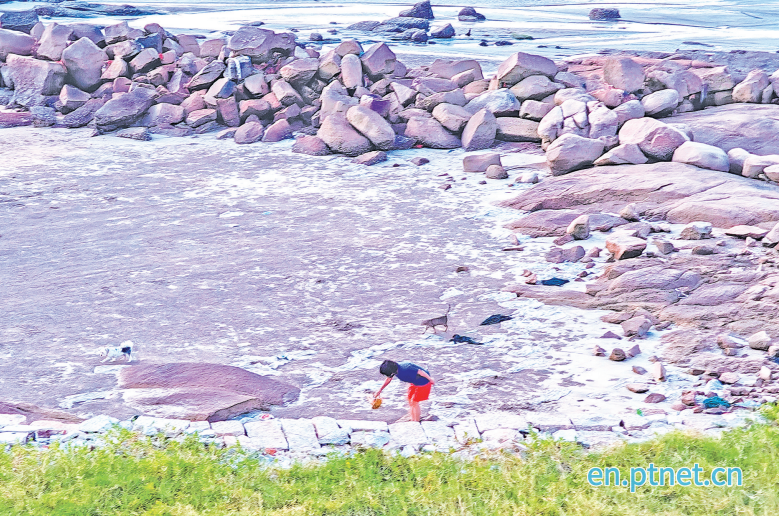
Yang Min, owner of Meow Garden Café, picks up trash on Pingtan's beach – joined by her cat. This small act ties to her café's "1 bag of trash = 1 free iced Americano" campaign to protect the island's oceans.
Pingtan's beauty relies on its oceans, and these entrepreneurs are taking action to safeguard it. Yang Min, owner of Meow Garden café in Zilan Village, is an avid paddleboarder. During her trips, she noticed piles of marine debris—plastic bags, bottles, foam boards—littering the beaches. To raise awareness, she launched a long-term campaign: "Bring a bag of marine trash, get a free iced Americano." "I don't just want to give out coffee," Yang said. "I want people to see how fragile our oceans are."
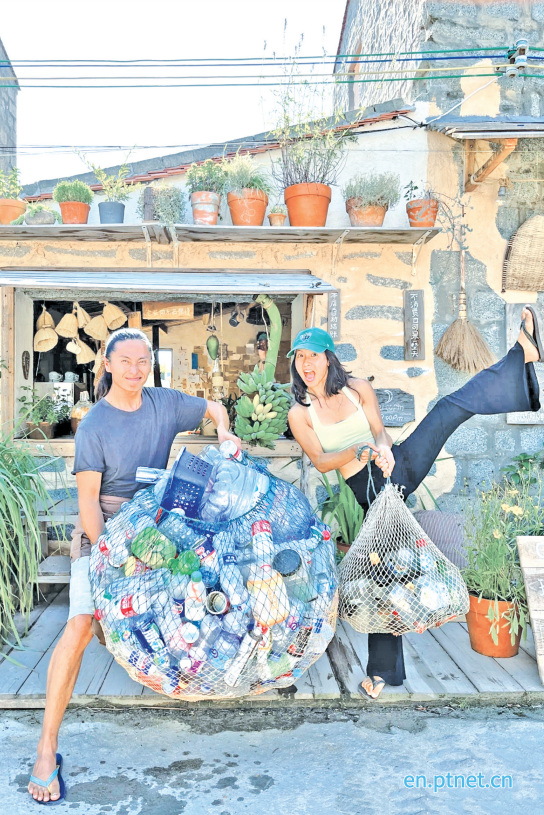
Yu – Pingtan's eco-focused shop named after ancient China's nature keepers – collects piles of plastic bottles, part of its "trash-for-drinks" campaign to encourage recycling.
In Houtian Village, Lei Lei and Bi Yi run Yu grocery store—named after "Yu," an ancient Chinese government role in charge of protecting nature. The shop sells eco-friendly products, handcrafted wooden items, and secondhand goods—all without excessive packaging. It also runs a "trash for drinks" program: villagers and tourists can exchange sorted recyclables for beverages. The initiative has become popular with local kids. "It's fun to pick up trash and get a drink," said an 8-year-old participant. "My mom says we're helping the sea."
From preserving local culture to warming community bonds and protecting the environment, these young entrepreneurs are proving that tourism can be more than just a business—it can be a force for good. For visitors to Pingtan, it's a chance to experience the island's true heart; for villagers, it's a reminder that their home is worth celebrating.

 Fujian Public Security Registration Code: 35012802000271
Fujian Public Security Registration Code: 35012802000271